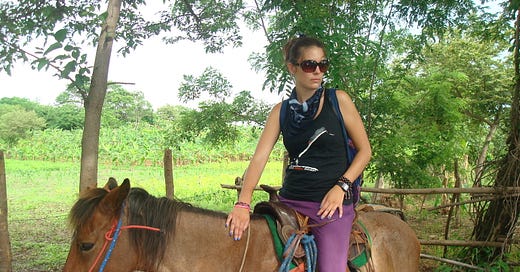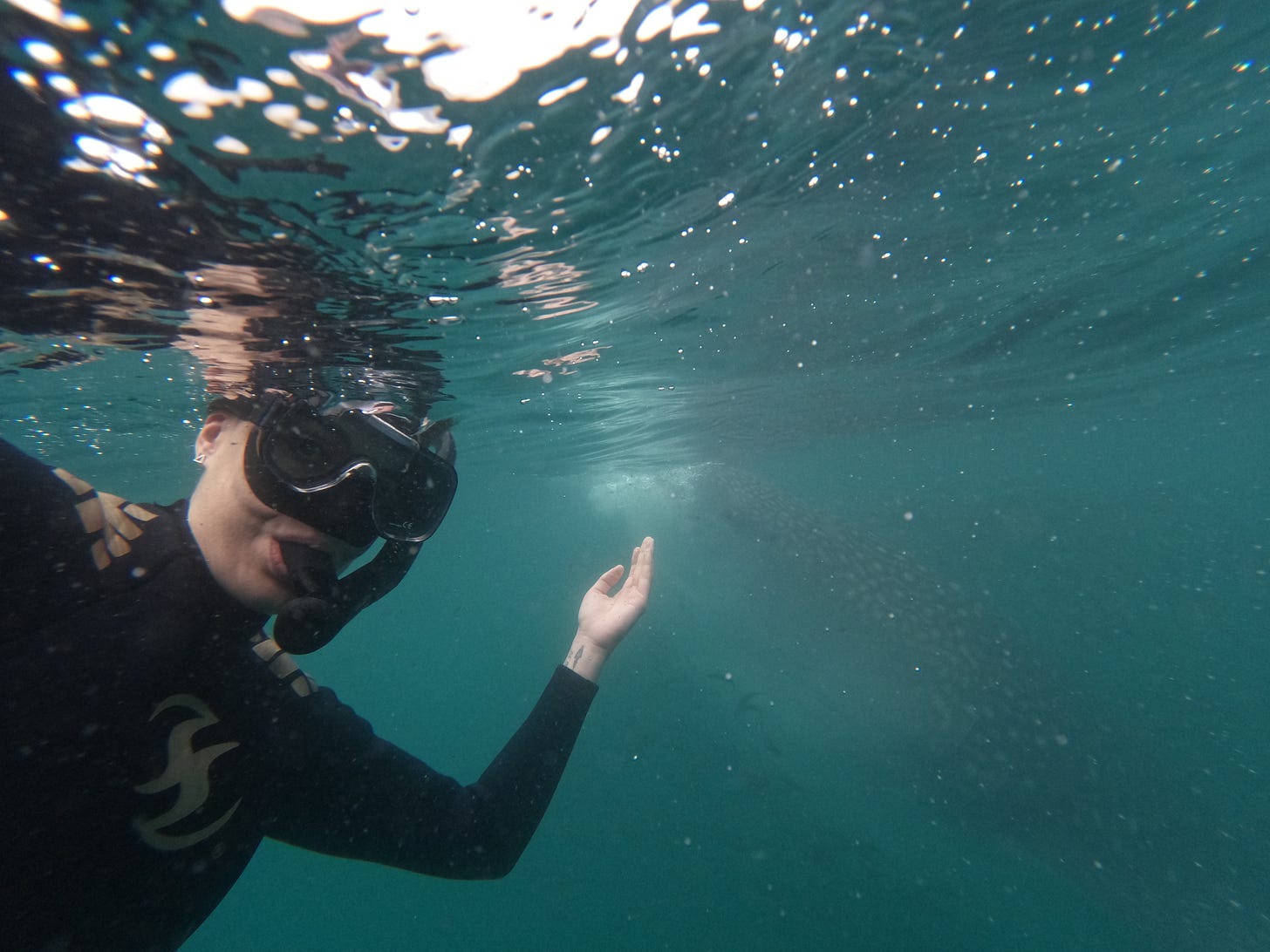My deepest desire was adventure and freedom...
Chronic Illness didn’t stop me from traveling—it redefined how I explore.
In Rooted & Rising, we explore limiting beliefs through the lens of the nervous system- how they can form and ways to deconstruct them.
If you missed the last edition, we explored the limiting belief that asking for help makes you a burden. Check it out below!
When I was a kid, I devoured every edition of my dad’s National Geographics. I couldn’t believe how interesting and beautiful the world was, and I knew from an early age that I wanted to experience it.
As a teenager, I started a list of 'things I want to do before I die' in a brown leather notebook. The list spanned everything from skills I wanted to acquire to places I dreamed of visiting to challenges I hoped to take on. Some of them were unrealistic (like being multilingual by 25, when I could barely get through high school French), and others were pretty unhinged. But they inspired me. They made the future feel full of possibility.
In my early 20s, I started crossing some things off that list. After taking on extra shifts to save for travel, I was able to take a backpacking trip through Nicaragua in 2012. But not long after, I was diagnosed with Celiac disease, and within a year, my mental health took a sharp downturn. The adventurous, wide-open world I had once dreamed of suddenly felt smaller, as the day to day became harder to navigate.
About six years of my twenties were spent navigating treatments, medical appointments, therapy, and various drug regimens. At times, I was on seven different medications, each with its own range of side effects. Worst of all, I wasn’t getting better.
Shortly after changing my treatment course, I developed fibromyalgia. Later, I was diagnosed with spinal arthritis, making my health even more complicated to manage for a long time.
During this period, I still traveled and pursued new experiences—but if I’m being honest, it wasn’t always a good time. I didn’t prioritize my health, nor did I adapt my activities or environment to fit the accommodations I needed. I also drank a lot to cope with social anxiety, trying to convince myself I was making the most of my twenties.
But instead of feeling free, I felt untethered from my surroundings. Difficult experiences compounded, and my capacity to cope in the face of stress reduced.
After a particularly rough period during the height of Covid, I came to the conclusion that maybe I couldn’t travel or pursue new experiences like I used to.
However, my belief that "I can’t travel or pursue new experiences" was largely due to my nervous system being in a protective state.
This happens through neuroception, our brain’s built-in threat detector. We discussed this concept in a previous post, but put simply, neuroception is how our nervous system unconsciously scans for safety or danger.
The reality was my health wasn’t good enough to pursue new activities at that time. However, our nervous system stores past experiences as implicit memories which inform our beliefs and predict future outcomes. While the past and our present reality may feel overwhelming, it doesn’t need to define the future.
The way we narrate our story shifts with our nervous system state. When we’re dysregulated, the survival brain steps in to protect us. That’s why it’s important to regulate the nervous system first—so we can reassess our story and beliefs with greater clarity.
For example, when I found myself in a constant state of dysregulation, my thinking became very black-and-white. I believed I wouldn’t improve—and even if I did, one wrong move would send me right back to the beginning, like having to restart level one of a video game. I saw only one way to do things, and if that wasn’t an option, I thought, why even bother?
But over time, I realized that my core desire was freedom—and I feared that my health challenges would take that away. The shift came when I saw that freedom isn’t just about physical ability; it’s about how we perceive safety, frame challenges, choose our responses, and reimagine our path forward.
For someone with chronic pain or illness, this might mean finding purpose and joy even within moments of physical limitation.
Reframe: I can pursue new experiences in ways that support my body’s needs.
Eventually, my health improved enough that I started thinking about traveling again. In 2022, I took the leap—I downsized my belongings, put the rest in storage, and bought a one-way ticket. But as I sat on the plane, panic hit me.
Did I make a mistake? Could I handle all the change and uncertainty?
I now understand this as my nervous system trying to protect me—fearing the unknown and anticipating potential pain or discomfort.
I slow-traveled for two years, and while I learned a lot about my limitations, I also discovered new possibilities and interests. There was a lot of trial and error, but I also became more strategic and adaptable:
I planned ahead to mitigate flares.
I paced myself to avoid overbooking and respect my energy levels.
I was upfront about accommodations I needed.
I became comfortable with missing out when necessary.
I prioritized nervous system regulation to stay within my Window of Tolerance, where I could best process stress and emotions.
I tried new activities, particularly creative things that I previously wouldn’t have.
Some things are simply harder for me now—horseback riding, for example, causes me too much pain. But instead of feeling restricted, I feel empowered to choose: Do I want to try it anyway and manage the risk, or find something else? Fortunately, being in water feels great for my body, so I gravitate towards those experiences instead.
Travel looks different for me now than it did before fibromyalgia and chronic illness. But honestly—who’s to say some of this isn’t just age? I probably wouldn’t be as keen to sleep on an airport floor or in a 20-person dorm like I did at 21. Even back then, scoliosis and back pain meant I never really felt great.
As humans, we’re constantly evolving, and we get to decide what that evolution looks like. There were frustrating moments—when my body didn’t cooperate, when I flared for days or felt homesick. I even contracted Dengue fever and was sick for four months.
But I don’t regret pursuing new experiences. These setbacks or “regressions” are simply new iterations of growth.
I also believe living with chronic pain and illness has made me more attuned to the beauty of everyday moments. I love a good sunset just as much (sometimes more) than a ‘must-do’ tourist activity.
Root & Rise Practices:
Journal prompt:
In what ways can I redefine freedom and adventure to fit my body’s needs?
What’s one experience I’ve been holding myself back from, and how could I approach it in a way that feels safe and aligned with my needs?
Expand your Window of Tolerance (WOT): The goal isn’t to eliminate discomfort but to expand our capacity for new experiences—and to return to our WOT when we’ve pushed past our limits. Some suggestions:
Slow belly breathing for a few minutes at a time, it doesn’t have to be any more advanced than that.
Grounding exercises, such as this contact points exercise.
Emotional Freedom Technique (EFT) tapping, I love EFT and do it on my own and with clients. You can also find free videos on YouTube.
Meditation, there is no right way to meditate, and you might find it easier to do a guided recording. Here’s one for a Loving-Kindness Meditation.
Slow exposure to new environments help the body feel supported rather than threatened.
A friend introduced me to this quote from the poet Mary Oliver, I thought it was a fitting way to end this post.
“Tell me, what is your plan to do with your one wild and precious life”
Do you have a bucket list? What are some experiences you want to pursue?
Gentle hug,
Caitlin
~ On Medium: Five Tips for Traveling with Fibromyalgia & Chronic Illness
Work with me:
1:1 Coaching: I help mission-driven people navigating chronic illness, neurodivergence, or overwhelm find clarity and sustain their purpose—without burning out. Book a free 30-min discovery call.
Pocket Coaching: A flexible, one-on-one coaching experience—no video calls, no fixed schedule. Just real-time support via text and voice notes. Book directly here.






